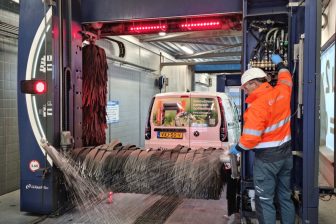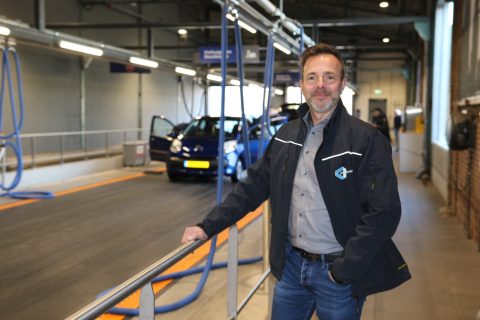
The American success story of Ammeraal Beltech
From building small conveyor belts for bakeries to a multinational with quite some takeovers along the route, the history of Ammeraal Beltech is an exciting one. Its plastic modular belts are a huge success in the American car wash industry.
CarwashPro spoke to Jean-Pierre Claassen, who is global industry segment manager automotive at the Dutch company. We met him at Loogman Carwash in Rotterdam, where they use the Uni-Chains belts of Ammeraal Beltech.
What exactly does Ammeraal Beltech do?
“We are a supplier and manufacturer of conveyor belts. In the broadest sense of the word. The food industry is our biggest market, but we also produce the checkout belt at local supermarkets and the treadmill belts at the gym. For the car wash industry and car factories, we produce moving floors. Personally, I’ve been responsible within Ammeraal for the automotive and car wash industry since 2012.”
A plastic link modular belt has its advantages over a chain conveyor. Can you explain that?
“That’s mainly in the user-friendliness and convenience. With a chain conveyor, a customer has to drive the front left wheel into the conveyor. That doesn’t always go well and many people even find it frightening or simply don’t dare to do it. My mother still asks if I want to wash her car.”
“With dual-track belts, you drive on them easily and only feel a small bump when you drive over a wheel pusher which helps pull the car through the carwash. The moment the car is completely on the belt, you don’t have to be afraid. Because if you accidentally put the car in park, hit the brakes or turn the steering wheel, nothing happens on such a belt. Whereas on a chain conveyor, anything can go wrong then.”
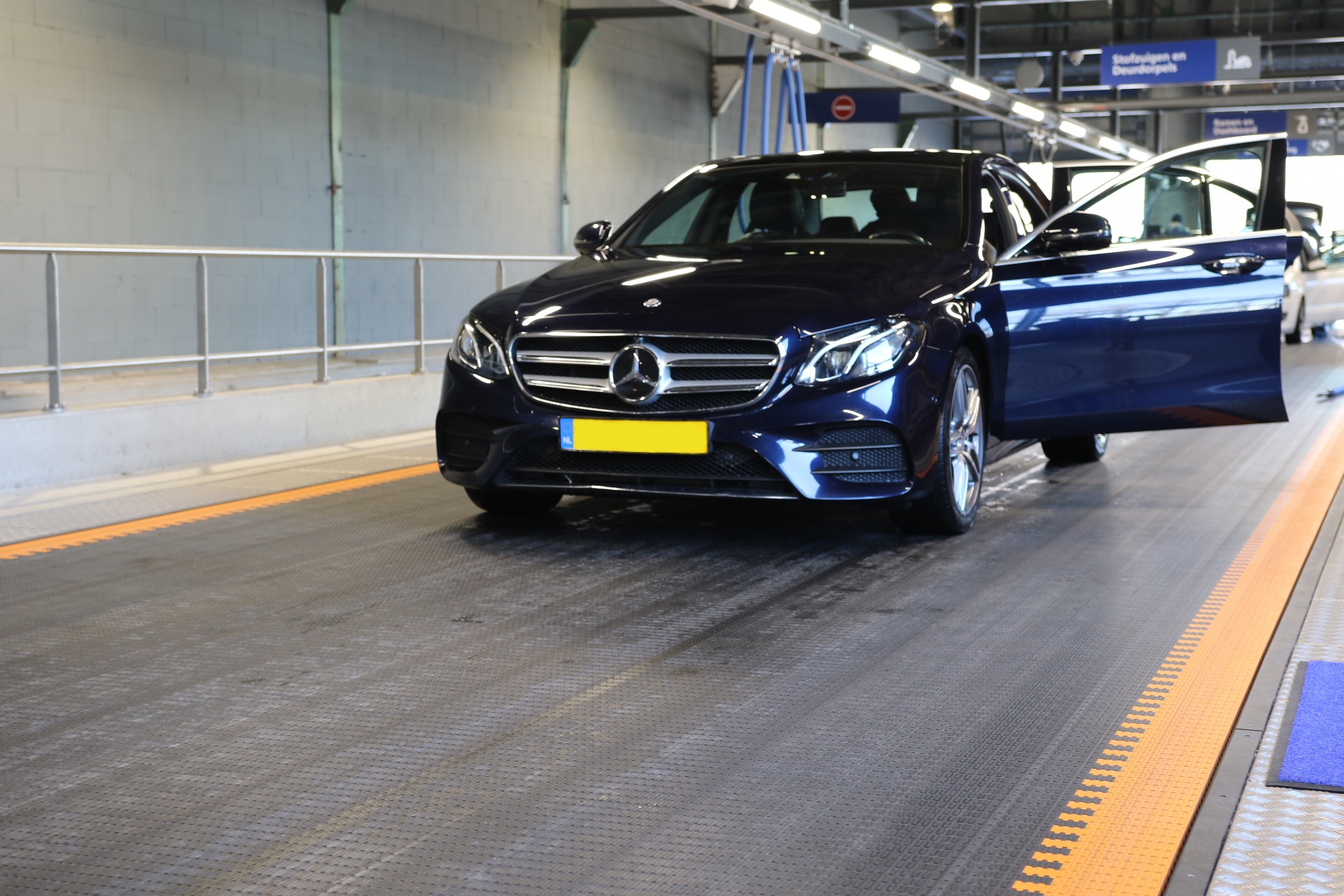
(Text continues below the image)
“Previous experiences in Canada have shown that inexperienced drivers try to avoid a chain conveyor because of the hassle. They prefer to use our belts. And the great thing is, they also don’t mind paying a little more for it than at the competitor with a chain conveyor. In the end our belt even attracted more customers.
We see the same thing in the Netherlands. People want convenience and car washes are increasingly becoming an experience. It has to smell nice, the lights have to be pleasant, and the more foam, lights and LEDs, the better the experience. A dual lane belt is an essential part of that.”
In America, are you already having a lot of success in the car wash business?
“America is a huge success story for us. There is a strong growing trend over there. The conveyor technology has been around for more than 20 years, but initially it came with many problems. When most of these were solved, other companies became interested and connections were made with the automotive industry. That’s also how we got into it. At that time we were already big in automotive, but still small in car wash. And we wanted to change that.”
“From our collaboration with Petro-Canada and STI Conveyor Systems, things really took off. Not only did the already high quality of STI’s systems increase even more, but also the reputation of our products grew tremendously. In that, our collaboration was unique. You can have a good conveyor system, but with a bad belt you are nowhere. Or the other way around: a bad system with a good belt doesn’t work either. In the car wash you have to have both.”
You supply the plastic link belts and other companies provide the conveyor systems. Can you elaborate on that?
“The car wash industry has relied on the chain conveyors for years. Many suppliers build those conveyors themselves. There are few parties that make the single and double track conveyor themselves. We work with some specialized suppliers and they can supply car washes directly or build conveyors for the big car wash companies which are then supplied in a total concept.”
“So Ammeraal does not sell the whole conveyor system but an important component of it. I promote the technology and our uni-chains belts and can refer clients to such a specialized supplier, if interested. We are also supportive towards the system builders and give advice on the design. Once a party masters that, it becomes easier to take a step back. The active role you play in the beginning is then no longer necessary.”
(Text continues below image)
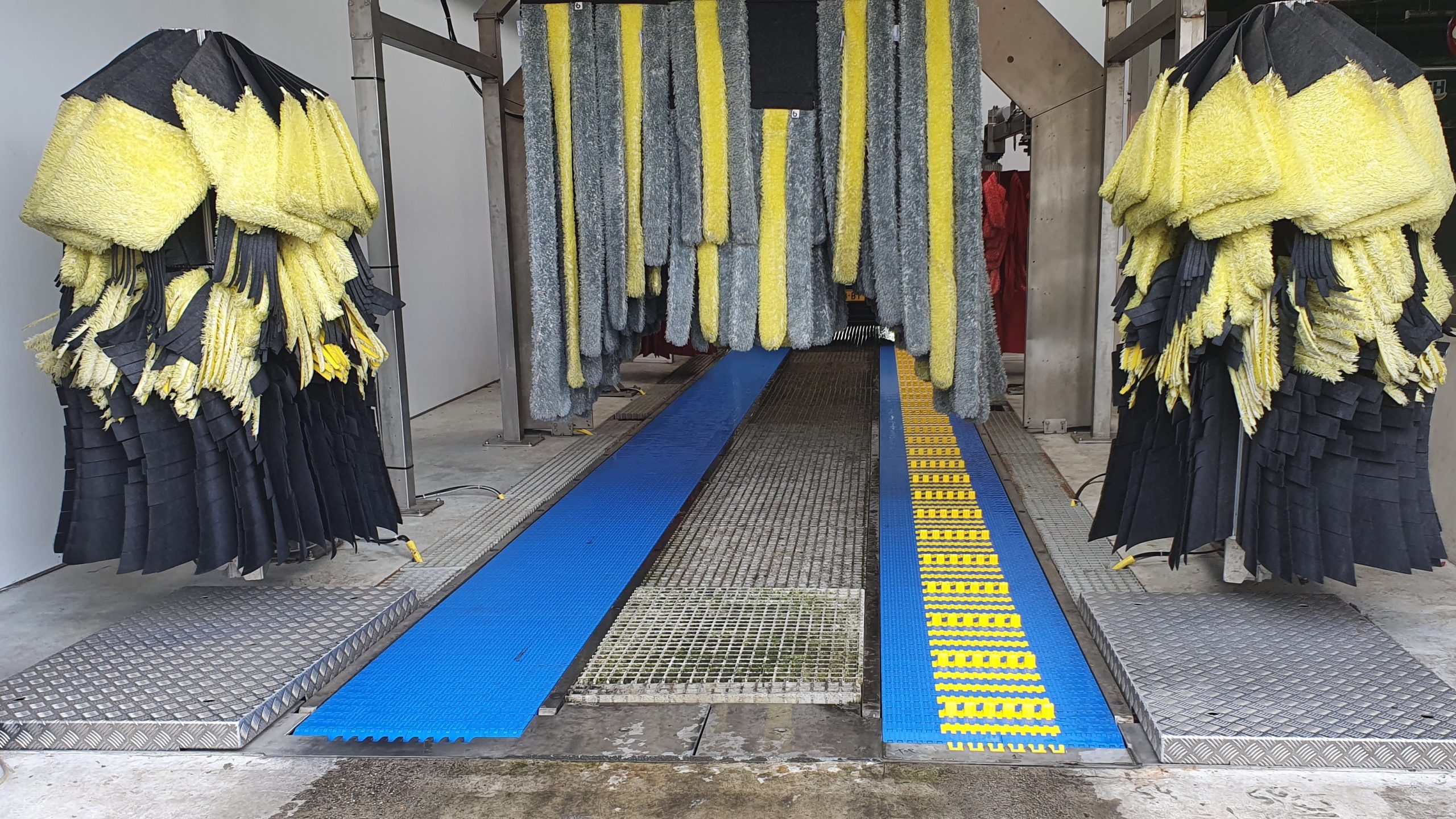
How does the cost of a link conveyor compare to a chain conveyor?
“I would venture to say that a chain conveyor system is about five times cheaper than a double-track link belt. That is also one of the reasons why we see little of it in car washes here in the Netherlands. After all, the Netherlands is known for its frugality. And of course I can’t expect a smaller car wash to invest hundreds of thousands of euros in a double-track. After all, it’s usually the bigger car washes that are pioneering this.”
“Despite being a more expensive product, it is important to pay attention to other factors. For example, look at the maintenance and service life of such a plastic modular belt. Our product is very low maintenance. It needs no lubrication, it is plastic with stainless steel pins connected, and it can be maintained quickly and without special tools. The belt is easy to open and close and requires little looking after.
What plastic belts do – after all, they are still plastic – is that they stretch slightly, especially from initial use. After a few months it’s necessary to check if that stretch has not become too long and then shorten it a little. But that’s easy to do: you stop the track, grab a screwdriver, pliers and a hammer and within a couple of minutes you’re done. That’s it. That’s all you have to do in terms of maintenance. You can’t do that with a chain conveyor. And if a chain conveyor breaks or quits at some point, then you have a problem altogether. Then you have long downtimes.”
“If you start calculating the total cost of ownership and the cost per wash, over the life and convenience of such a system, you already look at it very differently. It’s an investment that pays for itself. Especially if you look at the extra revenue you generate. Simply because it’s very customer-friendly with a belt. A smart businessman will take that into account.”
So Ammeraal focuses primarily on the large car washes?
“We don’t exclude any car washes. But it remains an investment and the big parties often have more investment power. In the Netherlands we work with large parties like Loogman and Autoradam, but we have also worked with several smaller car washes. All of them want to be distinctive with our technology, quality and support.”
Besides cost, are there other reasons why smaller car wash owners might be reluctant to choose a plastic belt?
“Another argument is that the rims would not get clean properly on a belt. Car washes say the rims have to rotate to get clean, whereas on a belt the wheels don’t move. Dutch consumers tend to be very critical of rim cleaning. In America this is much less so. That also has to do with the subscription model used by many car washes in the states.”
How would subscription washing take that argument off the table?
“If a customer washes the car twice a week, it’s easier to keep it clean. But yes, the Dutch consumer prefers to wash the car as little as possible because it costs money. So, when they take their car through the car wash, it has to be squeaky clean. Mr. Wash in Germany is a customer of ours, and they also have subscription car washes. The dual lane conveyors with our belts function just fine and customers don’t complain about the rims.”
Here at Loogman Carwash, a full-width belt was chosen for indoor cleaning. Is that an aspect within the car wash industry that you guys play a big role in?
“For interior cleaning, there is a choice between a wide belt or a dual lane conveyor. The dual lane technology is just a bit cheaper and easier to access, in terms of conveyor belts. But for operators perhaps a bit more difficult to use. Yet many operators who work with it do not experience it as a disadvantage. It is just what you are used to. And it makes no difference to the customer. They still drive the car on the track, get out and wait near the track until the car can be picked up again, completely fresh and clean.”
(Text continues below image)
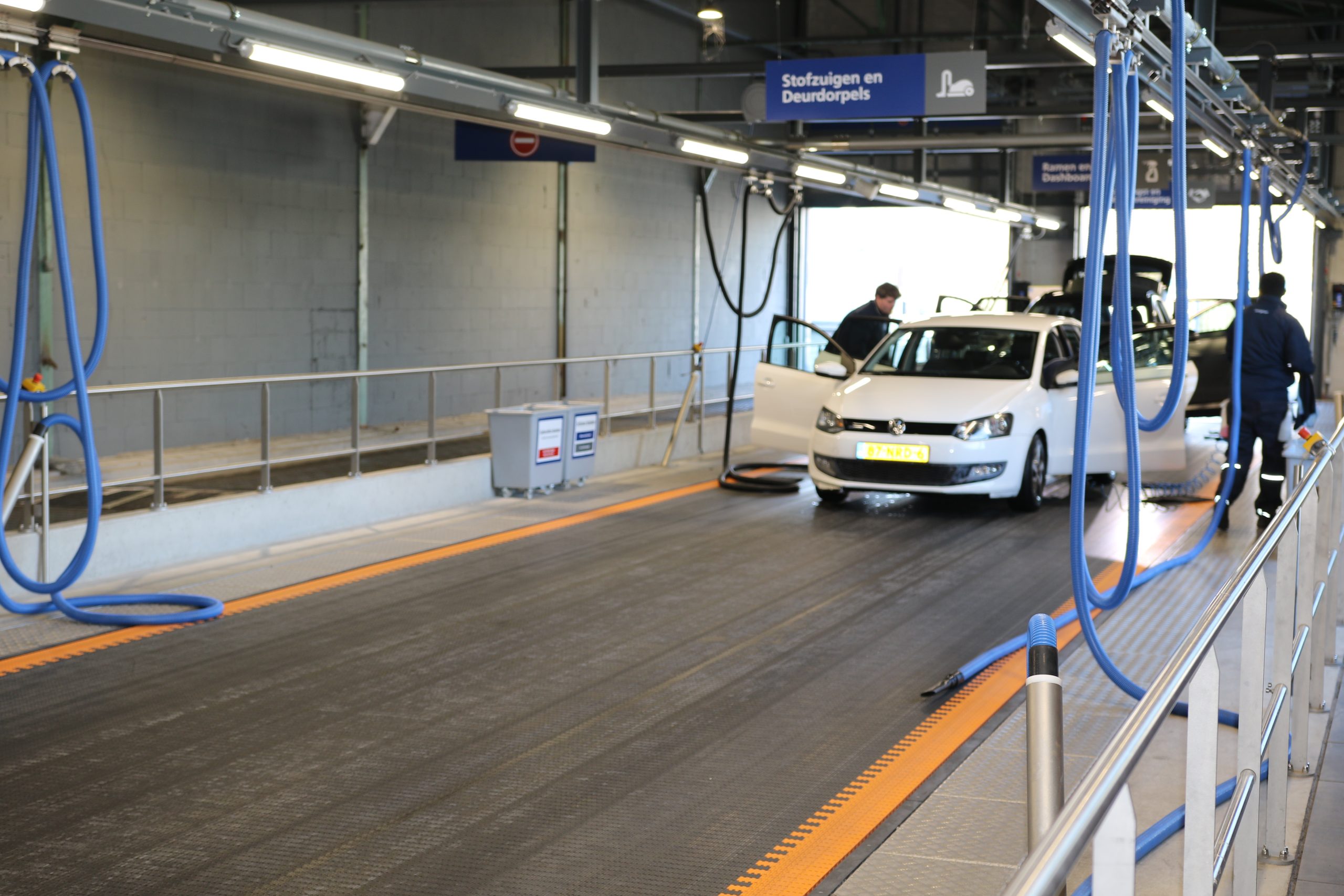
What makes Ammeraal Beltech different from other modular belt suppliers?
“We always say: you have to retain ownership of the performance of the products throughout their lifetime. Our service doesn’t stop after the belt has been delivered. We choose to stay in touch and follow things up. This way, you can extend the lifespan, lower the total cost of ownership and build a new case for investment at the same time.”
“In addition, the differentiation is also technical, it is in the way we drive our belts, the accessories we offer and the materials we use. We have and will continue to develop our belts.”
Where do you see new opportunities?
“We are now fully committed to car washes. It’s a stable market, not very vulnerable to economic changes. For example, if we have supply problems in the automotive industry, like with microchips at the moment, entire production sites are at a standstill. From Toyota to Volkswagen. Whereas the car wash business always goes on. We also see it as an advantage to be so close to the consumer market. The automotive industry, on the other hand, is more complex with very different requirements.”
“There is still a lot of growth in America but we now really want to break through in the Netherlands, Germany and the rest of Europe. In Asia, too, we already have successes and see good growth potential. Furthermore, I believe the Middle East is a very interesting market for premium tunnel wash.”
Origins
Ammeraal was founded in 1950 in the Netherlands. Following an acquisition by Partners Group in 2018, Ammeraal Beltech merged with Megadyne, the Italian power transmission giant. Together the two companies announced their new name in the same year: AMMEGA. The company has since grown into a global leader in the design, production, manufacture and maintenance of process and conveyor belts.
Also read:


